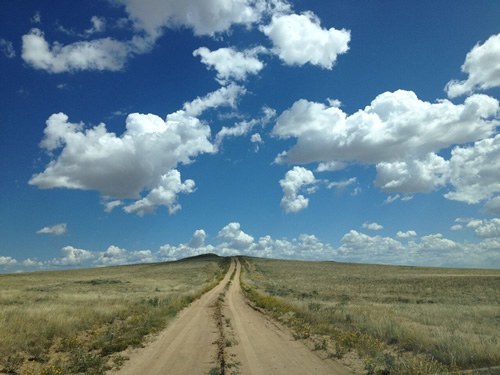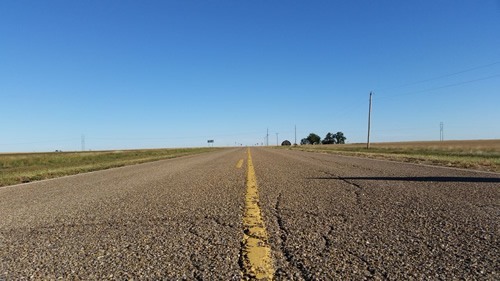Five Great American Roadtrip Books
That Aren't “On the Road”
By Robert Reid
Published 6/2015

|
|
Some great writers have an affinity
for dirt and other backroads.
|
Roadtrips are like snowflakes or fingerprints.
Each are familiar, but none match. And for those of us bit
by that kinetic fever — that unbearable urge to move —
nothing beats one. We go forward at our own will, where
and when we want, and forge out our own unique road print
across an endless web of roads. The only real debate is
whether to ask directions when we get lost.
Or what to read before we go.
Jack Kerouac’s On the Road remains
the iconic roadtrip book for most people. But that doesn’t
mean it’s the best. Nor is, I think, John Steinbeck’s Travels
With Charley, or William Least Heat-Moon’s Blue
Highways.
Here are five lesser-known alternatives
to help amp up your adventure.
The
Lost Continent: Travels in Small-Town America by Bill
Bryson
Quotable: “Out here in this crud-bucket
motel in the middle of a great empty plain I began for
the first time to feel at home.”
In Lost Continent, Bryson —
who grew up in Des Moines because “someone had to” — returns
after years in England, and his father’s death, to rediscover
the “magic places of my youth” at the tail end of the Reagan
area. His 13,978-mile route generally sticks with back roads
and American icons: the homes of Mark Twain, Lincoln, Elvis,
FDR, the Amish; plus college towns, Gettysburg, Selma, the
Rockies, Custer’s Last Stand. All the while, he’s searching
for “Amalgam,” the perfect American town he sees on TV and
film.
With cheeky wit weaned on years of British
life, Bryson leaves few prisoners. Iowan women look like
“elephants dressed in children’s clothes.” Michigan is “shaped
like an oven mitt and is often as exciting.” Of impression-less
Delaware, “I could feel it vanishing from my memory as I
went.” Even the great Mississippi appears “flat and dull.”
Eventually he concludes, “America has never quite grasped
that you can live in a place without making it ugly.”
He gets away with this because he so
often is moved by the exceptions: “inexpressively beautiful”
Appalachia, Iowa farms “hysterical with color and light,”
Vermont rides offering “a day trip to heaven.” Even Colonial
Williamsburg somehow inspires him.
When he returns to Iowa after his first
month on the road, he writes, “I actually felt my heart
quicken. I was home. This was my state.” And thinking of
Iowans again, “I was seized with a huge envy for these people…
their sense of community… And I felt guilty for mocking
them.”
Cross
Country, Robert Sullivan
Quotable: “On the road, everything
is a museum.”
Sullivan — who once spent nights in
New York City alleys watching rats — is an obsessive roadtrip
nerd, who’s crossed the country by car 30 times. And Cross
Country — filled with hand-drawn maps and photocopies
from his journal — recounts the entire culture and origins
of the American roadtrip as Sullivan rides from Oregon to
New York with his family.
For anyone who’s covered any distance
by car, it’s illuminating and fun: learning how “motels”
were born, where to play golf on a toxic waste dump, and
how tips stagecoach drivers gave riders in 1877 apply to
back-seat drivers today. And also that we’re driving in
the “golden age of coffee lid development,” as seen in the
evolution of coffee lids used at gas station on the interstate,
from the ill-conceived Push & Drink to the Solo Traveler,
the Optima, the wonderful DLX12R!

|
|
Crossing the country and making
discoveries along the way is an obsession for writers
such as Robert Sullivan.
|
The
Cruise of the Rolling Junk, F. Scott Fitzgerald
Quotable: Zelda (early on) “Gosh,
we’re smart… this is the best thing ever done,” (later)
“the joys of motoring are more or less fictional.”
In 1920, F. Scott and Zelda Fitzgerald
decided on a whim to drive to Montgomery, Alabama for a
breakfast of biscuits and peaches in Zelda’s hometown. Riding
in a 1918 Marmon dubbed the “Rolling Junk,” it took eight
days and 1200 miles to complete the task. (They returned
by train.)
Typical of the early roadtrip days,
much of the way is riddled with car problems. They’re barely
out of Connecticut before turning to their spare tire “Lazarus.”
Later the car body had to be welded back together. Mostly
this is handled in good spirit, perhaps because of the grand
historic inns the Fitzgerald’s ultimately steer for (some
that are still open: e.g. Princeton’s Nassau
Inn, DC’s Willard
Hotel, or Greensboro’s O
Henry Hotel).
The pace picks up in the south, as Fitzgerald
drives through a forested “green subway,” and tree branches
that reach over the car like the “faintly tired hauteur
of a fine lady’s hand.” He captures the Southern light too,
a half a century after the Civil War: “The sun was at home
here, touching with affection the shattered ruins of once
lovely things.”
(More troubling is Fitzgerald’s “unforgivably
breezy” attitude, as Paul Theroux writes, of African Americans
met along the way.)
Great
Plains, Ian Frazier
Quotable: “A person can be amazingly
happy on the Great Plains… Once happiness gets rolling
in this open place, not much stops it.”
Frazier moved to Montana to write a
novel, but became obsessed with the plains instead. In a
series of whirlwind roadtrips — often sleeping in his car
— he probes the past and present. (Frazier’s fond of driving.
For Travels in Siberia he foregoes the legendary
Trans-Siberian to drive across Russia.) What he
comes up with here is something of a guidebook to curiosity,
set in a 500,000-square mile land long mistaken for the
great American desert.
Many of his experiences in this 214-page
book lead him on/off Indian Reservations. He describes the
sound of the Sioux language as “soft and rippling, like
something you might hear through a bead curtain.” And picks
up hitchhikers, like Jim Yellow Earring, who leads him to
the site of Sitting Bull’s cabin site, where Jim offers
to rip out a rattlesnake tongue as a keepsake. (Frazier
declines.)
His paragraph of his love of the Lakota
warrior Crazy Horse is alone worth reading the book.
Roads:
Driving America's Great Highways, Larry McMurtry
Quotable: “As it is with women,
so it is with roads. There are too many nice ones.”
Steinbeck famously predicted in Travels
with Charley that interstates would make it possible
to cross the county and “not see a single thing,” but
McMurtry finds nearly the opposite. In this quick 206-page
travelogue, he sticks on the interstates, or “America’s
great highways,” picking and choosing preferred stretches
(which he likens to rereading select passages from great
novels).
Often the glory he finds regards big
skies and room to contemplate. Once
he extends a Kansas drive for an interstate sunset of a
wheat-colored light “developing purplish tinges along the
edges, like bruises on the sky.” And he fills a bland day
on I-70 through Ohio, Indiana and Illinois — near areas
where “even the arrival of the outlet malls is a blessing
“ — to answer “at least to my own satisfaction, the question
about where the Midwest begins.” (He votes for Columbus,
Ohio.)
America can never look the same, he
concludes, contrasting Steinbeck’s prediction. “The lights
will always differ… a thousand McDonald’s will never make
Boston feel like Tucson.”
Robert Reid has written a couple dozen Lonely Planet guidebooks,
talked travel on TV shows like the Today Show and CNN
Headline News, and writes regularly for National Geographic
Traveler. He lives in Portland, Oregon.
|
